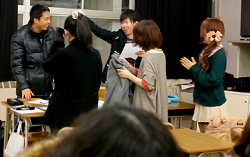Team Learning
- Details
- Written by Brent Duncan, PhD
Developing competency in essential communication practices and conflict approaches can enhance student performance and satisfaction in collaborative learning environments.
Objectives
- To understand how managing the communication cycle can lead to improved individual and group performance in learning teams
- To understand feedback as a process for generating individual and group growth
- To differentiate between functional and dysfunctional conflict
- To consider how using different communication styles can help us to manage different types of conflict more effectively
- Details
- Written by Brent A Duncan, PhD
When considering the positive results of Team Hachi Project, a collaborative action research project to assess the viability of team learning with remedial students in a lecture-based Japanese university, researchers considered if the Hawthorne Effect was more responsible for improvements than the team learning process they had introduced. This introduced a question about whether the results represented substantive or superficial improvements in student performance and satisfaction (Duncan, 2013). Reviewing assessment, survey, video, and interview data collected during the research cycles illuminated the Hawthorne Effect as a useful tool that teachers can leverage to influence substantial improvements in student and classroom, especially when integrated with scaffolding techniques suggested in Lev Vygotskiǐ’s (1978) theory of cognitive development and situational leadership approaches proposed in Gerald Grow’s (1996) self-directed learning model.
- Details
- Written by Brent A Duncan, PhD
Have you ever been on a winning team? How did it make you feel to be a participating team member? Did you have more fun playing the game with others than when you played the game alone? Did you become a better player by practicing with the other team members? Did the team become more successful when it helped individuals develop better skills? Have you ever noticed effective groups that achieve high-performance levels, like a championship baseball team, a rock band, a debate team, a school orchestra, or a product development team? What makes those groups successful?
- Details
- Written by Brent A Duncan, PhD
School can be difficult and tedious, especially if we do little more than prepare to take tests. Do you ever wish that school could be more fun, like when you play games with friends? The interesting thing about playing games with others is that, besides having fun, we become stronger and smarter as individuals, build better relationships with others, and develop the discipline to help us become more successful in school, work, and society.
Why can’t school be more like that?


![Communication is a process of negotiating to create shared understanding [Image: CoPilot] Communication is a process of negotiating to create shared understanding [Image: CoPilot]](/images/Images/a_man_and_a_woman_creating_shared_meaning_through_communication250.png)





![Your brain can keep growing, adapting, and learning at any age, if you are willing to put in the effort [Image: Copilot]](/images/Images/best-years-for-adult-brain300.png)